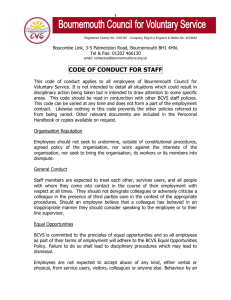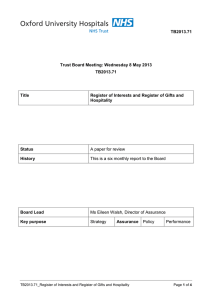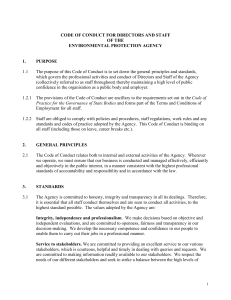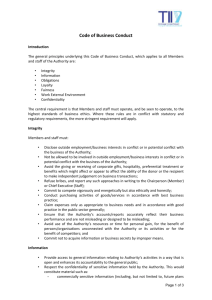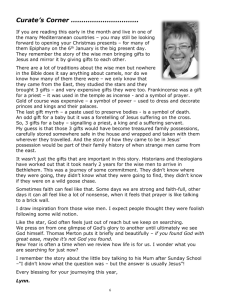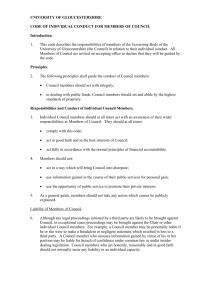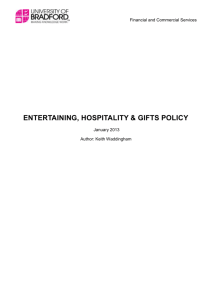Code of Conduct for Staff
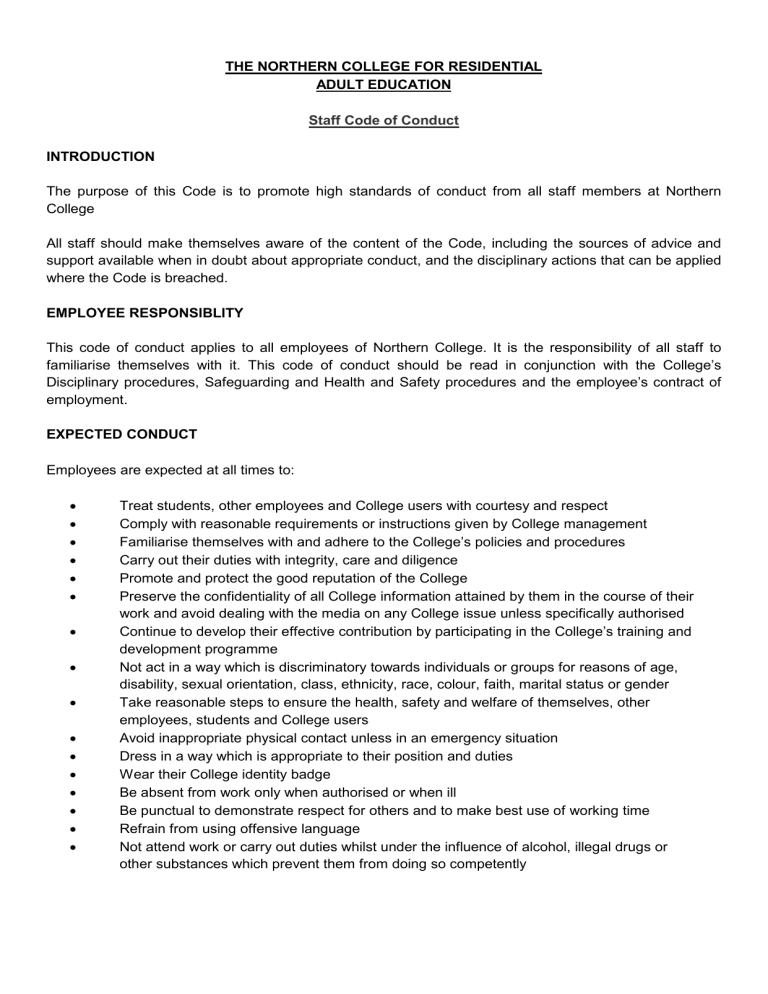
THE NORTHERN COLLEGE FOR RESIDENTIAL
ADULT EDUCATION
Staff Code of Conduct
INTRODUCTION
The purpose of this Code is to promote high standards of conduct from all staff members at Northern
College
All staff should make themselves aware of the content of the Code, including the sources of advice and support available when in doubt about appropriate conduct, and the disciplinary actions that can be applied where the Code is breached.
EMPLOYEE RESPONSIBLITY
This code of conduct applies to all employees of Northern College. It is the responsibility of all staff to familiarise themselves with it. This code of conduct should be read in conjunction with the College’s
Disciplinary procedures, Safeguarding and Health and Safety procedures and the employee’s contract of employment.
EXPECTED CONDUCT
Employees are expected at all times to:
Treat students, other employees and College users with courtesy and respect
Comply with reasonable requirements or instructions given by College management
Familiarise them selves with and adhere to the College’s policies and procedures
Carry out their duties with integrity, care and diligence
Promote and protect the good reputation of the College
Preserve the confidentiality of all College information attained by them in the course of their work and avoid dealing with the media on any College issue unless specifically authorised
Continue to develop their effective contribution by participating in the College’s training and development programme
Not act in a way which is discriminatory towards individuals or groups for reasons of age, disability, sexual orientation, class, ethnicity, race, colour, faith, marital status or gender
Take reasonable steps to ensure the health, safety and welfare of themselves, other employees, students and College users
Avoid inappropriate physical contact unless in an emergency situation
Dress in a way which is appropriate to their position and duties
Wear their College identity badge
Be absent from work only when authorised or when ill
Be punctual to demonstrate respect for others and to make best use of working time
Refrain from using offensive language
Not attend work or carry out duties whilst under the influence of alcohol, illegal drugs or other substances which prevent them from doing so competently
PROFESSIONAL RELATIONSHIPS
The College is committed to providing a learning environment in which relationships between staff, students and other College users are cordial and professional. Employees are in an unequal power relationship with students and must recognise professional boundaries. They must ensure that their relationships with students or with other staff members are not of a kind that compromise or could be perceived to compromise their professional responsibilities, e.g., an undeclared personal relationship in which the staff member is assessing the student’s work or has responsibility for an aspect of the management or remuneration of the other staff member.
Staff must be mindful at all times of the necessity to treat students equally, to avoid favouritism, and to exercise care in the pursuance of any relationship outside of the learning environment. Whilst in an adult learning environment the establishment of a social relationship with students can be positive, there are inherent pitfalls in maintaining professional boundaries in some activities. Activities which give individual students privileged access to aspects of a member of staff’s personal life should be approached with great caution.
Staff should also avoid situations where they are alone with students in informal settings such as student bedrooms.
PERSONAL CONDUCT OUTSIDE OF THE COLLEGE
An employee’s conduct in their private life becomes a matter of concern for the College where it damages the College’s reputation or makes an employee unsuitable for the work for which they have been employed. Behaviour relating to violence, dishonesty, substance abuse including alcohol, sexual offences and other serious offences are likely to come into this category.
GIFTS AND HOSPITALITY
Employees must not accept or solicit gifts or benefits that might in any way compromise or influence them in their capacity as employees of Northern College
Employees should be careful to ensure integrity over receipt of gifts, hospitality and benefits during the course of carrying out their duties. Gifts or benefits that are more than of small value should be brought to the notice of the Clerk to the Board of Governors and recorded in the confidential register of interests, in accordance with the register guidelines.
The informal exchange of gifts and hospitality between staff and students is strongly discouraged because of potential conflict of interest
CONFLICT OF INTEREST
In discharging College business, all employees need to be aware of actual, potential or perceived conflicts which might arise between their private interests and their College responsibilities.
Actual, potential or perceived conflict of interest may arise in connection with, for example:
personal and family relationships;
staff and student relationships
financial interests and affiliations;
receipt of gifts and hospitality;
acceptance of outside professional work or secondary employment;
use of Northern College information;
misuse of College premises, equipment and materials
external activities and public comment;
This list is not exhaustive.
It is the responsibility of each employee to disclose to their line manager details of situations that may give rise to an actual, potential or perceived conflict of interest.
Employees in management positions must be especially alert to the various situations in which conflicts of interest may arise in the workplace and handle such situations with common sense and in a sensitive manner. If in doubt, they should seek advice from their line-manager and, if necessary, the Personnel
Manager.
Area
Personnel
Sub Area
Prepared By
Approved By
Document Manager
Last Updated
Next Review Date
Assessment Dates Where Appropriate
Equality Impact Assessment
Sustainability Assessment
Safeguarding Assessment
Leave
Denise Pozorski
Policy and Finance
Momina Ahmed
January 2014
January 2017
